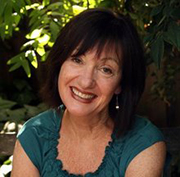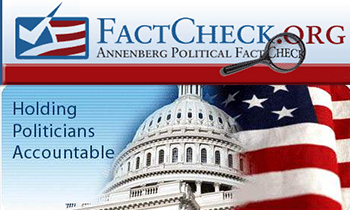
As the U.S. elections near the finish line, the presidential campaigns are throwing around enough verbal attacks and inflammatory advertising to make the average voter’s head spin. Fortunately, there are now three excellent sources for fact-checking political discourse online: Annenberg Public Policy Center’s FactCheck.org, the St. Petersburg Times and Congressional Quarterly’s PolitiFact and the Washington Post’s Fact Checker blog. And on the local level, there’s a new crowd-funded effort from Spot.us, Newsdesk.org and Public-Press.org to fact-check local political mailers in San Francisco.
While these sites have grown in name recognition and popularity over the past few months, they still lag behind the efforts of partisan groups who fact-check the media themselves at Newsbusters.org (for conservatives) and Media Matters (for liberals). A scan of web traffic, as measured by Compete.com, and links from the blogosphere, as measured by Technorati, shows how far the non-partisan efforts lag behind the partisan ones:
Newsbusters
Compete.com traffic (August ’08): 472,489 unique visitors
Technorati rank: No. 67
Google News mentions: 79
Media Matters
Compete.com traffic (August ’08): 312,728 unique visitors
Technorati rank: No. 47
Google News mentions: 58
FactCheck.org
Compete.com traffic (August ’08): 277,555 unique visitors (up 1,000% in the past year)
Technorati rank: No. 89
Google News mentions: 1,254 (though this includes syndicated stories by FactCheck)
PolitiFact
Compete.com traffic (August ’08): 87,602 unique visitors
Technorati rank: None (2,560 blog reactions)
Google News mentions: 190
Washington Post’s Fact Checker blog
Compete.com traffic: N/A
Technorati rank: None (2,357 blog reactions)
Google News mentions: 171
Interestingly, the non-partisan sites receive a greater number of Google News mentions, indicating that more established news sources are citing them. But the non-partisan sites also have to struggle to break through the clutter of so much media banter and political talking heads on TV around the issue of who is lying and who is truthful in political discourse.

Bill Adair is the Washington bureau chief at the St. Petersburg Times and editor of PolitiFact, which just won a Knight-Batten Award for Innovation in Journalism. Adair says that political journalists have been handcuffed by the idea that being fair means reporting what both sides say in a campaign, withoutcalling out politicians for falsehoods.
“Political journalists — myself included — have been too timid about fact-checking in the past because we were afraid we would be criticized for being biased,” Adair said via email. “But facts aren’t biased. Now, we are finally calling the balls and strikes in the campaign the way we should have in the past.”
Can Non-Partisan Sites Break Through?
So how can FactCheck.org, PolitiFact, and Washington Post’s Fact Checker blog get more notice from confused voters? FactCheck.org started in late 2003, is now syndicated on the Newsweek website, and includes a blog called The FactCheck Wire and weekly video reports. PolitiFact is just a year old, but now includes many ways for people to get their “Truth-O-Meter” reports: widgets, RSS feeds, twice-weekly emails and an iPhone application. The Post’s Fact Checker blog includes Pinocchio nose ratings for falsehoods and asks the audience to help in fact-checking.
Reviewing these sites, I wondered whether pointing out factual errors would really lead the candidates to change their ways or stop lying. Adair said it wasn’t up to non-partisan sites to do that.
“Newspapers run our items in their papers,” he said. “So there are plenty of opportunities for people to see our work. If the candidates are still making exaggerations and telling falsehoods, that’s between them and the voters. Our job is not to get politicians to stop lying. Our job is to inform voters. After that, it’s up to the voters.”
Right now, though, it’s the partisan fact-check sites that are getting more traction and are more popular among bloggers who link to them. Adair doesn’t believe that they will win the trust of a broader public, however.
“I think partisan fact-checking sites will always have their biases questioned,” he said. “The best fact-checking comes from non-partisan journalistic sources.”
Adair said that PolitiFact is “completely transparent” and includes sources to back up its stories as well as author archives for people to check. But there is no personal information for the writers that might point to how they’ve voted in the past, or if they’ve volunteered for political campaigns. FactCheck.org states clearly that its publisher accepts “NO funding from business corporations, labor unions, political parties, lobbying organizations or individuals. It is funded primarily by the Annenberg Foundation.”
But does such transparency and dedication to neutrality matter to the public? They are becoming less enthralled with the work of traditional journalists — who they suspect as being biased — and like to go to partisan sites for political news online.
“I think that the fact checkers are useful, in so much as the public actually cares about the facts,” said Shaun Dakin, CEO and founder of the National Political Do Not Contact Registry to stop robo-calls from candidates. “The bottom line is that most of the electorate sees the day-to-day campaigning through their own rose-colored glasses. Most Democrats think McCain is lying. Most GOP voters think Obama is a loser with no experience. Every day they see the election through those frames…Unfortunately, it is an echo chamber — particularly on the Internet.”

Robert Steele, a journalism professor at DePauw University and senior faculty at the Poynter Institute (which also owns the St. Petersburg Times), said that the fact-checking of politicians’ statements goes back to the work of the late Carole Kneeland in the ’80s in Texas. Steele thinks the various non-partisan sites do have a challenge in breaking through the media clutter online.
“It’s hard to keep up with the candidates’ statements and their ads, especially when there’s so much puffery and some outright lying by the candidates,” he said via email. “And then there is the ‘viral’ nature of the Internet (and to some degree talk television and talk radio) that rapidly passes along falsehoods. The key to successful fact-checking efforts is creating a rigorous process for research that can work quickly in this white-hot media environment. I do believe the good fact-checking sites make a difference, especially the ones that have credibility based on their independence and their skilled work.”
Getting Local
While the fact-check sites are focused very closely on the national campaigns, who’s watching the local races? The new Spot.us site is an experiment in “crowdfunding” journalism run by Knight News Challenge winner David Cohn, who writes for MediaShift’s sister site, Idea Lab. Spot.us recently helped raise $2,500 for the sites Newsdesk.org and Public-Press.org to run a non-partisan series of stories fact-checking local political mailers in San Francisco.

Michael Stoll, the project director for the non-commercial Public-Press.org site, told me that Newsdesk.org’s Josh Wilson had a longtime interest in doing election ad fact-checking so it was a good fit for them to work together on it. Stoll hopes the site’s new “San Francisco 2008 Election Truthiness” series will go beyond mailers and include ads in other media.
“Our first trial run we’re focusing on the deluge of paper that stuffs our mailboxes and gets hung from our doorknobs in the weeks preceding the election,” Stoll said via email. “We’ll also try to capture radio, TV and Internet broadcast ads. In addition, we’ve already started picking apart the partisan, paid arguments in the voter-information booklet that the city distributes to every voter. All these ads are fair game.”
Stoll says their reports will be featured on local public radio station KALW and likely in print with the San Francisco Daily Post. Despite this cross-platform outreach, it’s unclear how interested the public will be in such a project. Stoll says that the journalists writing the reports will be vetted for partisanship or any hidden agendas, and will include biographies saying where they’ve worked and whether they have been activists for political causes before.
“I think that while it’s unrealistic to have a large percentage of San Francisco voters reading this online with only viral promotion and no marketing budget, we would hope to get several thousand readers on each story this fall,” he said. “We also want to generate significant buzz in key constituencies, such as the campaigns themselves, because part of the point of fact-checking is to send a signal to advocates on all sides that there are independent watchdogs keeping track of their perhaps exaggerated claims and counterclaims.”

As newspapers and magazines cut back on their own staff of fact-checkers, will these local and national online fact-checking sites help bridge the gap? Barbara Kelley, a journalism instructor at Santa Clara University, said the various sites might help fact-check political statements — but might also be used as a crutch by hamstrung news organizations.
“We shouldn’t NEED outside fact-checking sites,” Kelley told me via email. “I worry that if there is a cadre of these outside sites, it might give reporters and news organizations a get-out-of-jail free card and/or enable lazy reporting, as in: ‘Well, I can just report what so-and-so says on the stump without getting into the validity of what he or she says. After all, if it’s wrong, FactCheck.org will do the digging and correct it.’…It also puts too much of a burden on the ordinary news consumer who doesn’t have the time, energy or savvy to root things out on the Internet all day, as you and I do.”
When the Toronto Star recently interviewed FactCheck.org’s director Brooks Jackson, he said that he would really prefer for news organizations to do the fact-checking we expect from them so he can get on with his life:
It’s definitely ruined my fishing season once again. This is not the way I had planned to spend my semi-obscure retirement years. When’s it all going to end?…What would really be nice is if other news organizations would do what the St. Pete Times and Washington Post are doing, and put us out of business. I’ve been saying for a long time it ought to be an embarrassment to any news organization that we exist. Isn’t this a core First Amendment responsibility? I think so.
As news organizations continue to cut back on fact-checkers, there’s little chance they can be counted on to hold politicians’ feet to the fire. Perhaps non-profit sites like FactCheck.org and crowdfunded efforts like Spot.us will help bridge the gap. But it still remains to be seen if they can work in concert with other political coverage at traditional media sites.
“Can [fact-check sites and mainstream media] work in tandem? I think they absolutely should,” said Kelley. “But that also can bring problems. There was a Boston Globe piece that referenced Obama talking about McCain’s plan to privatize Social Security and how the recent stock market collapse could have affected current retirees. Then the article quoted FactCheck.org saying Obama was wrong because McCain had proposed this plan only for those born in 1950. The article left it at that — without getting into any of the nuances, so Obama’s statement was dismissed as non-factual, but the point of what he was saying was missed.
“Finally, how many fact-check sites will reporters rely upon? You have to wonder where the sites themselves get their info — do they go back to original transcripts? Multiple sources? And also, which ones will become the arbiters of truth? Will it be like relying only upon the New York Times or AP to tell us what’s going on in Washington or Iraq? I guess what I’m saying is that, like soup kitchens, fac


Thanks for the quote. Great article. I think that the future will be local fact checking sites for races such as “dog catcher”.
Shaun Dakin
CEO
http://www.stoppoliticalcalls.org/index.php
I agree: great piece, interesting topic, lots of layers. I like the quote from Jackson, FactCheck.org’s director, who said, “What would really be nice is if other news organizations would do what the St. Pete Times and Washington Post are doing, and put us out of business.”
so here’s the new thought question: in today’s newsroom climate, how do we go about doing that?
thanks! barbara kelley (www.jlinx.blogspot.com)
Part of the problem is that most of the traditional media (print, radio and television) rarely has any real subject knowledge in the areas in which they’re reporting. As a result, there’s a strong tendency to rely on people they’ve encountered previously. Unfortunately, those subject experts usually have a strong personal point of view that the reporter overlooks. The result is that narrow opinion is stated as fact or as a broad consensus. Because reporters easily come to treat these people as friends, they’re reluctant to accept valid criticism of the material they provide. On a couple of occasions I’ve had reporters take my pointing out bias or factual errors in material from these sources as a personal insult.
I can’t begin to count the number of news reports I’ve seen or articles I’ve read that report verbatim some press release from an advocacy group as if it were fact or a disinterested viewpoint. A lot of purported fact checkers are the same. If someone is unwilling or unable to dig up the facts for themselves, they’ll probably get a closer approximation to the truth by reading multiple fact checkers with a broad spectrum of overt opinions than they would by relying on any self-styled “objective” or “neutral” fact checker.